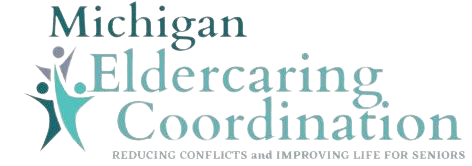WHAT IS ELDERCARING COORDINATION?
It is an alternative dispute resolution process that enables families to resolve disputes in a manner that respects the need for safety and autonomy of their elderly loved one – in a private forum with an Eldercaring Coordinator's assistance. Eldercaring Coordinators are highly qualified individuals in specific disciplines with specialized conflict resolution training appointed by the courts.
WHAT ARE THE BENEFITS OF ELDERCARING COORDINATION?
- Meets unique needs of families in high conflict regarding the care and safety of their elderly loved ones.
- Early identification of potential risks and safety issues for Elders.
- Conserving resources as non-legal issues are addressed by family members without judicial intervention, reducing time in court.
- Addresses the intergenerational effects of conflict regarding the care and safety of elderly persons.
- Allows for a less restrictive alternative to guardianship while responding to care and safety issues.
WHY IS ELDERCARING COORDINATION NEEDED?
A process to protect and preserve the Elders’ exercisable rights. Elders are dying because their families argue about their care instead of caring for their loved ones. These non-legal issues can be addressed during Eldercaring Coordination instead of the court.
HOW DOES ELDERCARING COORDINATION WORK?
As an alternative to proceedings in court, it is in the best interest of Elders, their family members, and legally recognized decision-makers to have access to a non-adversarial process to resolve disputes relating to elders on the Elders’ wants, needs, and best interests. An Eldercaring Coordinator is appointed to strengthen the voice of the Elder and facilitate in getting the family to focus on the Elder’s needs and wishes.
CAN ELDERCARING COORDINATION BE USED WITHOUT A COURT ORDER?
In general, if a family can come together to address issues, mediation is the right spot. The court order is needed if the families disagree on a date and time and would not continue to come to mediation sessions even if they came to the first session. Eldercaring coordination holds families in high conflict accountable.
WHAT TYPE OF LICENSURE WOULD A PERSON NEED TO BE AN EC?
Since there is no current certification for eldercaring coordinators, they need to be professionally licensed or regulated by their state to promote their quality of service. The Guidelines for Eldercaring Coordination are not specific about which profession; the intention was that there would be a grievance board and continuing education requirements.
IF, AFTER THE TWO YEARS, AND THERE ARE STILL ISSUES THAT HAVE NOT BEEN RESOLVED, WOULD YOU CONTINUE TO FOLLOW THE CASE OR REFER OUT ELSEWHERE?
Throughout the eldercaring coordination process, the eldercaring coordinator helps the family build a support system, including service providers and available resources. After the eldercaring coordinator's term is completed, the eldercaring coordinator is no longer on the case unless the court extends their term. That means the EC does not follow the case unless they are ordered and retained again in the future. The family should already have had guidance in resolving outstanding issues (e.g., mediation, settlement conference) or those that might arise.
WHAT IS THE AVERAGE COST A FAMILY HAS TO PAY?
There is no set number of meetings or hours spent with families throughout the two years since each family has unique characteristics. The general range of fees charged by eldercaring coordinators in Florida is between $75 - $225 per hour, with most eldercaring coordinators using a sliding scale fee arrangement. It is important to note that the parties share those fees, and there have been between 2-11 parties per case thus far.
DOES THIS GET COST PREVENTATIVE, SUCH AS TRANSFORMATIVE LAW DOES...IF YOU HAVE TOO MANY ATTORNEYS OR SPECIALISTS INVOLVED.
This is not a process that requires a certain number of professionals to collaborate, and eldercaring coordinators are trained to be very mindful of affordability issues. Rather than have professionals attend meetings, information can be brought in by the parties. Attorneys, although welcome, do not have to participate in all meetings, and many opt-out altogether after the orientation meeting once they realize the eldercaring coordinator is only addressing non-legal issues; they remain available to assist upon request.
IS THERE AN AGE OF ELIGIBILITY? OR DOES THIS ALSO APPLY TO INDIVIDUALS WITH A DISABILITY WITH A COURT ORDER?
The elder's age is 60 years in most states, but it does depend on the statutory definition of “elder” in that state. While we see a transformation of the coordination process at some point for disabled and under 60 years old, it is more appropriate for many of those cases to use parenting coordination instead.
ARE HEALTHCARE PROVIDERS INVOLVED IN THE PROCESS FOR THE ELDER?
Of course, healthcare providers are involved with the elder, but it depends on the subject of the conflict whether any providers are invited to the process. It is more likely that the parties will bring in the information necessary or that the eldercaring coordinator, in some instances, speaks directly with the provider.
| FAQs |

